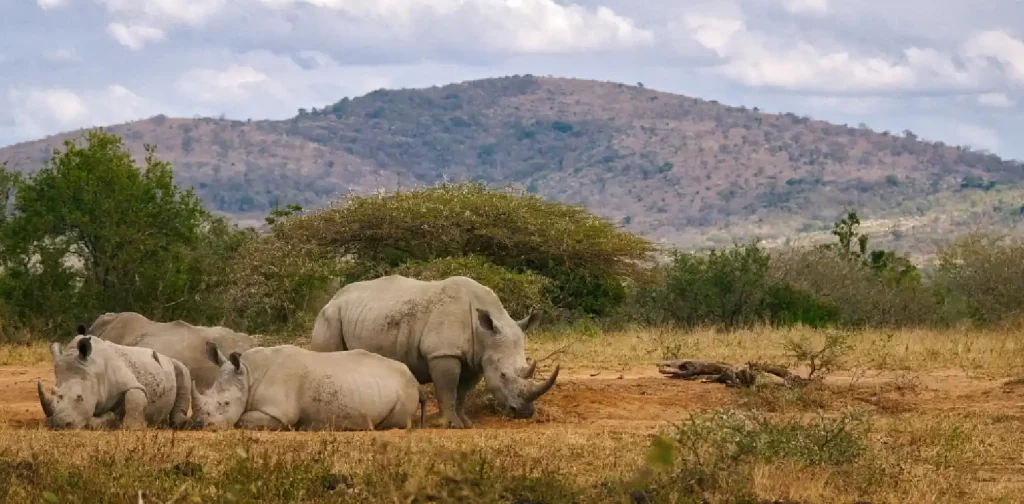Poaching of African Rhinos Increases in South Africa

Photo: Matthias Mullie on Unsplash.
The African continent is known for its rich biodiversity. South Africa is home to various plant and animal species, including the African rhinos. However, poaching has significantly reduced the African rhino population in the country. In a recent update, the government revealed an increase in rhino poaching in South Africa.
African rhinos population
Most African rhinos live in southern African countries, including Namibia, Botswana, Zimbabwe, and South Africa. They play a vital role in shaping and balancing the ecosystems by acting as important grazers. Additionally, rhinos also attract tourists, thus creating job opportunities and generating income for locals.
Unfortunately, the number of African rhinos has been declining over the years. This decline is attributed mainly to poaching, which is the illegal killing and trafficking of wildlife. Rhinos are sought after for their horns, which are used for traditional medicine. The issue was especially prevalent between 2007 and 2014 when the number of African rhinos poached in South Africa spiked from 13 to 1,215.
Increasing poaching cases
In a statement released on February 27, 2024, South Africa’s Department of Forestry, Fisheries, and the Environment revealed increased rhino poaching in the country. The government noted that 499 rhinos were poached across South Africa, 51 more rhinos than the previous year.
“The pressure again has been felt in the KwaZulu-Natal (KZN) province, with Hluhluwe-iMfolozi Park facing the brunt of poaching cases, losing 307 of the total national poaching loss. This is the highest poaching loss within this province,” said Barbara Creecy, the Minister of Forestry, Fisheries, and the Environment of South Africa.
Meanwhile, the Kruger National Park (KNP) recorded 78 poaching cases in 2023, showing a 37% decrease compared to 2022.
The increasing poaching issue happened after some progress was made in 2022. According to the IUCN, there was a 4.2% increase in black rhino and a 5.6% increase in white rhino populations across Africa. This further highlights the urgency to address poaching and other wildlife crimes to create steady, significant progress in wildlife conservation.
Collaboration to combat wildlife crime
One of the keys to combating wildlife crime is through collaboration. In the statement, Minister Creecy further shared that the government is commencing cross-department engagement and strengthening public-private partnerships to address wildlife trafficking.
Furthermore, the Department of Forestry, Fisheries, and the Environment (DFFE) also plans to revise the Black and White Rhinoceros Biodiversity Management Plans (BMP) to enhance the strategic approach and action plan for African rhinos conservation across the country and continent. Ultimately, reducing wildlife crime must also go hand-in-hand with improving biodiversity management for more effective progress in biodiversity protection and preservation.
Editor: Nazalea Kusuma

Co-create positive impact for people and the planet.
Amidst today’s increasingly complex global challenges, equipping yourself, team, and communities with interdisciplinary and cross-sectoral insights on sustainability-related issues and sustainable development is no longer optional — it is a strategic necessity to stay ahead and stay relevant.

Kresentia Madina
Madina is the Assistant Manager of Stakeholder Engagement at Green Network Asia. She holds a bachelor’s degree in English Studies from Universitas Indonesia. As part of the GNA In-House Team, she supports the organization's multi-stakeholder engagement across international organizations, governments, businesses, civil society, and grassroots communities through digital publications, events, capacity building, and research.


 Indian Gig Workers Push Back Against 10-Minute Delivery Service Strain
Indian Gig Workers Push Back Against 10-Minute Delivery Service Strain  Call for Governance: Grassroots Initiatives Look to Scale Efforts to Conserve Depleting Groundwater
Call for Governance: Grassroots Initiatives Look to Scale Efforts to Conserve Depleting Groundwater  Integrating Environment, Climate Change, and Sustainability Issues into Education Systems
Integrating Environment, Climate Change, and Sustainability Issues into Education Systems  Finally Enforced: Understanding the UN High Seas Treaty
Finally Enforced: Understanding the UN High Seas Treaty  Risks and Opportunities of Submarine Communication Cables for Sustainable Development
Risks and Opportunities of Submarine Communication Cables for Sustainable Development  Rising Attacks and Violence Against Land and Environmental Defenders
Rising Attacks and Violence Against Land and Environmental Defenders